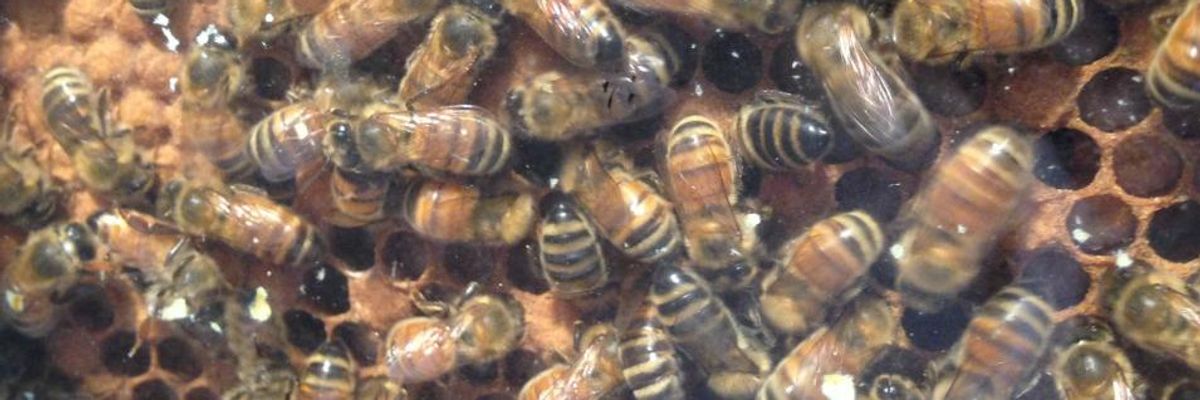More than half of the plants being sold at major garden retailers under the guise of being "bee-friendly" are treated with bee-killing pesticides, according to a report released Wednesday.
In the largest examination to date following a landmark 2013 study, scientists with Friends of the Earth U.S. (FOE) and the Pesticide Research Institute tested plants purchased from Home Depot, Lowe's and Walmart in 18 cities across the U.S. and Canada. And despite being branded as "bee-attractive" plants, the research revealed the "widespread" presence of the neonicotinoid pesticides, or neonics, in these plants.
According to the analysis, Gardeners Beware 2014: Bee-Toxic Pesticides Found in "Bee-Friendly" Plants Sold at Garden Centers Across the U.S. and Canada (pdf), neonicotinoid residues were detected in 36 out of 71 (51 percent) of commercial nursery plants, some in concentrations high enough to "kill bees outright." Some 40 percent of the samples contained two or more varieties of neonics.
"Unfortunately," the report authors write, "home gardeners have no idea they may actually be poisoning pollinators through their efforts to plant bee-friendly gardens."
Bees and other pollinators are essential for the production of two-thirds of the food crops humans eat every day. "Our own survival is tied closely to the survival of bees and other pollinators and we really need to listen to the body of science which is telling us to take swift action to help them," said Master Beekeeper Erin MacGregor-Forbes during a Wednesday press conference announcing the report.
Neonics, manufactured primarily by Bayer CropScience, Syngenta, and Dow AgroSciences, have been found to be a major contributing factor to the perilous and mounting problem of honey bee losses.
As MacGregor-Forbes told Common Dreams, neonic-treated plants will continue to have poisonous nectar and pollen for the life of the plant. "So perennials and trees will be poisonous for a long time and neonics will also persist in the soil and cause successive plantings in the same location to also produce nectar and pollen that are harmful to bees and other pollinators," she added.
"Our own survival is tied closely to the survival of bees and other pollinators and we really need to listen to the body of science which is telling us to take swift action to help them,"
--Master Beekeeper Erin MacGregor-Forbes
The pesticides are used as seed treatments on more than 140 crops and can either poison bees directly or cause sub-lethal effects such as "altered learning, impaired foraging and immune suppression, which exacerbates the lethality of pathogen infections and mite infestations," the report notes.
The FOE report comes on the heels of a Worldwide Integrated Assessment of the effects of neonics and found that their presence in soil poses a threat on par with that of DDT causing grave harm to entire ecosystems.
Last year, the European Union instituted a temporary ban on the three most widely used neonicotinoids. In the face of a mounting call to ban their use in the U.S., BJ's Wholesale Club--with more than 200 locations in 15 states--announced Wednesday that they will require vendors to remove neonics from plants by the end of 2014 or require warning labels for plants treated with neonics.
Environmental groups and consumers are hoping other U.S. retailers follow suit.
"We're calling on retailers to get neonicotinoid pesticides out of their plants and off their shelves as soon as possible," said Lisa Archer, director of the Food & Technology program at FOE. "Until then, gardeners should buy organic plants to ensure the safety of bees."
_____________________

